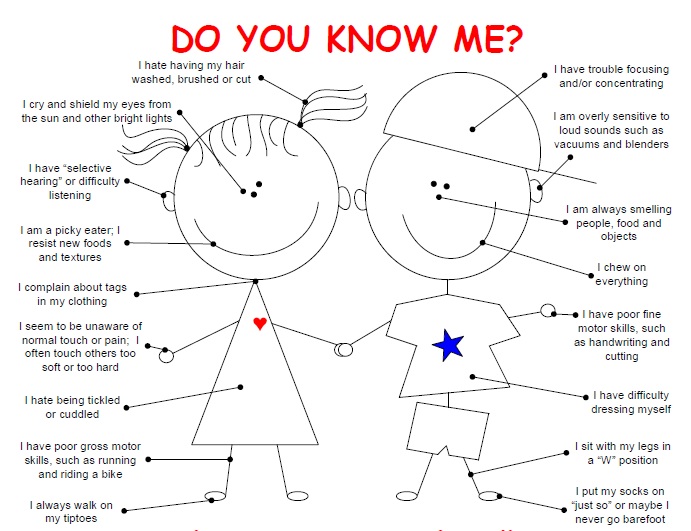By Michelle Critelli, OTR/L
Everyone knows a person or child who has at least some of the above issues. It may even be yourself and you never knew why certain clothing bothered you or why you hate loud noises so much. Maybe you or your child is quite clumsy or just can’t seem to follow directions or pay attention. It very well may be your body’s poor sensory processing.
Sensory processing refers to the way the nervous system receives messages from the senses and turns them into appropriate motor and behavioral responses. Whether you are biting into a sandwich, riding a bicycle, or reading a book, your successful completion of the activity requires accurate processing of sensation.

One study (Ahn, Miller, Milberger, McIntosh, 2004) shows that at least 1 in 20 children are affected by sensory processing disorder in their daily lives. Another research study by Alice Carter and colleagues who are members of the Sensory Processing Disorder Scientific Work Group (Ben-Sasson, Carter, Briggs-Gowen, 2009), suggests that 1 in every 6 children experiences sensory symptoms that may be significant enough to affect aspects of everyday life functions. Symptoms of sensory processing disorder, like those of most disorders, occur within a broad spectrum of severity. While most of us have occasional difficulties processing sensory information, for children, adolescents, and adults with sensory processing disorder, these difficulties are chronic, and they can significantly disrupt everyday life.
Occupational therapists are highly trained to evaluate and treat children with sensory processing disorder. Therapy sessions are fun, and are subtly structured so that your child is challenged but always successful in completing each activity. The emphasis of therapy is on developing automatic and appropriate responses to sensation in an active, meaningful, and fun way by interacting in a large occupational therapy room filled with hanging equipment such as nets, ropes, swings, and other sensory equipment.
To find out more about sensory processing disorder and how occupational therapy can treat it, contact us by visiting our website!
